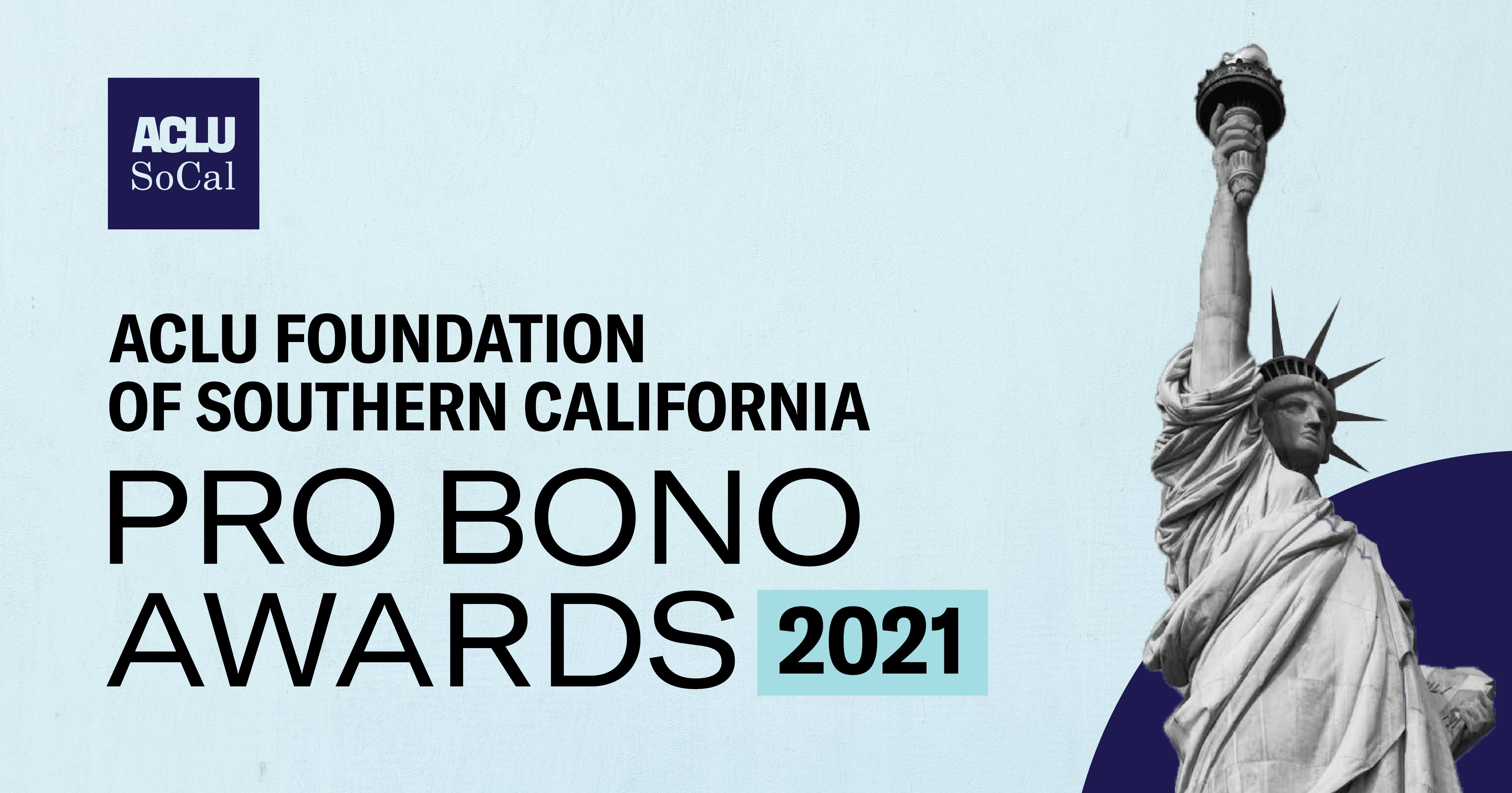The term pro bono comes from the latin pro bono publico, meaning “for the public good.” And that indeed describes the enormously valuable volunteer work of law firms that have co-counseled with us on lawsuits and other actions to further civil rights and civil liberties for our communities in the southland.
The attorneys and support staffs at these firms devote thousands of hours of work, at no cost to the ACLU Foundation of Southern California or our clients, in mapping out legal strategies, formulating critical court documents and providing other crucial means of support.
Every year, we take the opportunity to recognize and honor firms that worked with us on a variety of cases with our Pro Bono Awards. Below is a list of this year’s awards and their recipients, which appears in the April 2021 issue of Los Angeles Lawyer including the names of attorneys and other staff.
To put it simply: we could not have done this work without them. We thank and honor these firms.
Download the full ad in Los Angeles Lawyer magazine (.pdf)
A.L. Wirin Pro Bono Award – Munger Tolles & Olson LLP
Named for one of the first attorneys in the United States to work pro bono, the A.L. Wirin Pro Bono Award goes for a second time to Munger Tolles & Olson (MTO) for being an extraordinary partner on ACLU SoCal cases and issues, dedicating dozens of attorneys to our joint commitment to social justice.
Access to Justice Award – Munger Tolles & Olson LLP
MTO attorneys who worked on the Youth Justice Coalition v. City of Los Angeles case that defended due process rights of class members unjustly subjected to gang injunctions receive the Access to Justice Award.
Civil Liberties Award – Morgan, Lewis & Bockius LLP
Morgan Lewis & Bockius partnered in challenging the unlawful use of force and harassment by police officers on four high-school students in the City of Delano. The advocacy led to a settlement dismissing the errant charges against the students. For this work the firm is receiving the Civil Liberties Award.
Freedom of Information Award – Munger Tolles & Olson LLP
MTO also took on the Herculean task of collaborating to enforce laws that opened police records on uses of force and officer misconduct, including in the Johnson v. L.A. County Sheriff’s Department lawsuit. The numerous attorneys and paralegals involved in this effort receive the Freedom of Information Award.
Gender Justice Award – Alexander Morrison + Fehr LLP
Alexander Morrison + Fehr, co-counseled on two cases — Atkinson v. AECOM and Bragg v. Pacific Maritime Association — two cases that brought attention to cases of pregnancy discrimination, sexual harassment and lactation discrimination. For that work it is receiving the Gender Justice Award.
Humanitarian Award – Bird Marella P.C., Covington & Burling LLP and Latham & Watkins LLP
When COVID-19 forced the nation to shut down, people who were incarcerated were left in crowded institutions that were tinderboxes for the spread of the virus. We were joined by three remarkable firms that addressed different aspects of the crisis. They are all receiving this year's Humanitarian Award:
- Bird Marella for work on the prison-related COVID-19 cases of Wilson v. Ponce and Torres v. Milusnic.
- Covington & Burling that collaborated in Ahlman v. Barnes to bring urgent attention and relief to the dangerous conditions in Orange County jail facilities.
- Latham & Watkins for work challenging the conditions at the Adelanto Detention Center in Hernandez Roman v. Wolf.
Immigrants' Rights Award – Munger Tolles & Olson LLP
MTO attorneys who worked on Kidd v. Wolf — a lawsuit aimed at forcing ICE agents to stop using impersonation tactics and other unlawful practices during home arrests — receive the Immigrants’ Rights Award.
Pro Bono Award – Loeb & Loeb LLP
Loeb & Loeb provided a wide variety of legal and advocacy support involving numerous in-house projects. For its contribution of rigorous legal expertise and guidance the firm is receiving the Pro Bono Award.
Numerous other firms — and their attorneys and other staff members — provided invaluable co-counseling and other support in the last year. We are deeply appreciative of their contributions and name them:
|
Altshuler Berzon LLP Ballard Spahr LLP Paul Nicholas Boylan Cohen Williams LLP Cooley LLP Davis Wright Tremaine LLP Feigen Law Group Gibson, Dunn & Crutcher LLP Greenberg Glusker LLP Law Offices of Matthew Green Jenner & Block LLP Kaye, McLane, Bednarski & Litt LLP Kirkland & Ellis LLP Lakin & Wille LLP Milbank LLP Morrison & Foerster LLP |
Nixon Peabody LLP O’Melveny & Myers LLP Orrick, Herrington & Sutcliff LLP Outten & Golden LLP Perkins Coie LLP Riley Safer Holmes & Cancila LLP Rothner, Segall & Greenstone Rukin Hyland & Riggin LLP Sheppard, Mullin, Richter & Hampton LLP Sidley Austin LLP Simpson Thacher & Bartlett LLP Skadden, Arps, Slate, Meagher & Flom LLP Troutman Pepper Van Der Hout LLP White & Case |
